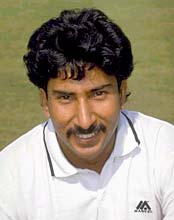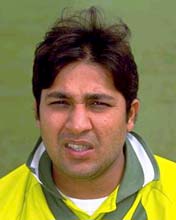Who's investigating the investigators?
Daniel Laidlaw
So Pakistan's players have been cleared of match-fixing in the 1999 World Cup, we learnt in the release of the ICC-instigated Bhandari Commission
report last weekend. It says something about cricket's weariness with the
subject of corruption that this almost forgotten inquiry received such
little fanfare. And given its conclusions, that was understandable.
As has been the case before, the lack of anything more than circumstantial
evidence, quite reasonably, resulted in the clearance. "The Commission is of
the view that it is difficult to hold this match (Pakistan-Bangladesh) was
fixed," the report stated. Short of witnesses viewing money changing hands,
secret tape recordings or other tangible evidence, it was never going to be
any different.
 But haven't we been through this before? Did not the much-delayed Qayyum
commission of inquiry ban Salim Malik and fine several others, including
current players Wasim Akram, Waqar Younis, Saeed Anwar, and Inzamam ul-Haq,
for varying degrees of unco-operation in 1999?
But haven't we been through this before? Did not the much-delayed Qayyum
commission of inquiry ban Salim Malik and fine several others, including
current players Wasim Akram, Waqar Younis, Saeed Anwar, and Inzamam ul-Haq,
for varying degrees of unco-operation in 1999?
Whereas the Bhandari commission specifically probed whether two matches - Pakistan-Bangladesh and Pakistan-India - at the World Cup were fixed and has
an ad-hoc feel, the Qayyum commission comprehensively investigated
allegations of match-fixing against Pakistan generally. The terms of
reference were different, but the Qayyum Commission report remains easily
the more authoritative of the two.
However, the one intriguing aspect to emerge from the Bhandari inquiry was
the anonymous letter alleging a $US1,500,000 payment was made into Pakistan
Cricket Board (PCB) accounts, following a conversation overheard by the
author in which the government told the PCB it would have to raise its own
finances. The suggestion was that this payment resulted from the Bangladesh
match being fixed, which was refuted because it was shown that the payments
received were television rights money from Transworld International.
Still, what the allegation raises is an almost universally ignored
possibility - that match-fixing does not merely concern the involvement of
corrupt players, but extends all the way to board level. Moreover, it raises
the implication that players, rather than acting purely in their own
interests as is commonly thought, could be involved in match-fixing under
the specific directive of their board. Unlikely? Well, it at least merits
some thought.
Point C of the Bhandari inquiry terms of reference was "to determine whether
some individuals were responsible for match fixing and betting". If
"individuals" was meant to include members of the board from that time,
fine, but if not then the scope was somewhat limited. Only on the basis of
the allegation contained in the letter did the Commission seek to
investigate the accounts of the PCB.
 If cricket boards - and we're not accusing anyone in particular here, just
speculating generally -- were systematically involved in match -- or
event-fixing as a form of extra-curricular revenue-raising, it would help
explain their reluctance to punish their own players. Typically this has
been thought a question of national pride, but if corruption involved the
governing body then investigations and internal sanctions against players
would understandably be a delicate proposition.
If cricket boards - and we're not accusing anyone in particular here, just
speculating generally -- were systematically involved in match -- or
event-fixing as a form of extra-curricular revenue-raising, it would help
explain their reluctance to punish their own players. Typically this has
been thought a question of national pride, but if corruption involved the
governing body then investigations and internal sanctions against players
would understandably be a delicate proposition.
Without wanting to cast aspersions on the PCB or any current administration,
the plight that Boards like the PCB is presently suffering, missing out on
valuable revenue, can't be ignored. Let's face it, national cricket boards
probably have been, and in some cases possibly still are, run by some
questionable characters, against whom the corruption of players likely pales
in comparison. Under financial duress, or simply out of greed, would it not
be possible for influential members of authority to conduct match-fixing as
a means of raising funds?
The Australian Cricket Board, as we know, originally hid the Waugh-Warne
money-taking affair from the public. It is difficult to believe this is the
worst of offences perpetrated by officialdom.
One suspects there is a lot we don't know about the mentality of players
involved in corruption. Can we be certain that ODIs aren't really regarded
as inconsequential jobs, with results bearing so little significance that
revenue is to be maximised in any way possible? Resentment over pay and
conditions, a long-standing issue in cricket, must only have exacerbated the
risk of this mindset developing.
But the proliferation of ODIs in the 1990s could have been a financial
bonanza for unscrupulous administrators in more ways than one, too. Not only
is it questionable how the status of ODIs are regarded among players, but
the possibility of official involvement in corruption is also a grey area.
To continue the conjecture, by backing the opposition, and instructing
influential players through whatever means to ensure a certain outcome, and
rewarding them in the process, board officials could generate some
substantial additional sums. Even if this has never occurred, and it is
nothing more than supposition, it is still unrealistic to assume that
corruption taints players, with all their flaws, but goes no higher.
Officials are surely not greater paragons of virtue.
Such arrangements would not be as difficult as imagined, either. By using
contacts linked to a variety of legal and illegal bookmakers, the
manipulators could wager on the opposition or controllable events within a
match, ensure the ensnared players comply and are handsomely rewarded for
their participation, and watch the money roll in.
Disturbingly, it would not even have to excessively damage their team's
interests. There are enough "dead" or relatively inconsequential ODIs - such
as Pakistan-Bangladesh at the World Cup, and even Pakistan-India in the
Super Six - to make the odd killing without resorting to fixing matches of
prestige like elimination games in the World Cup. Wasim Akram has long
alleged a campaign against him by former PCB chief Majid Khan, who along
with Sarfraz Nawaz has been one of the chief accusers. Why is this so? What
kind of internal politics are at work? There are possibilities all is not
what it seems.
That's the unexplored side of match-fixing. It might well be entirely
baseless, but it still deserves some official consideration. Unfortunately
it's hard to investigate the boards when they are the authorities who set
the terms of the investigations.
More Columns
Mail Daniel Laidlaw